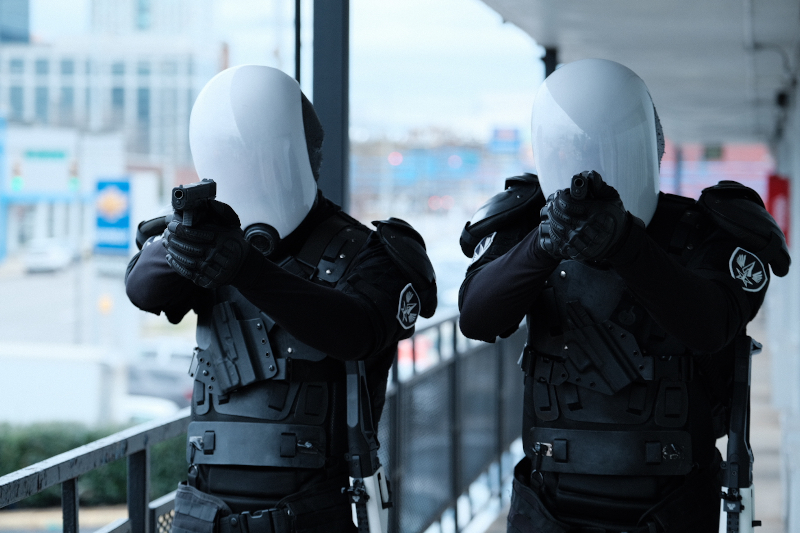Director – Brock Heasley – 2023 – US – Cert. 12a – 115m
***
A former hedge fund manager is separated from his wife when a mysterious stranger ‘shifts’ him into a parallel world devoid of hope – out on digital from Monday, March 25th and Blu-ray / DVD from Monday, April 1st following its release in cinemas in the UK on Friday, December 15th
A fully clothed, bloody-handed man unexpectedly finds himself in the middle of a lake, swims to shore and, in voice-over, introduces us to a flashback as to how he got there. Fearing for his job security in a stock market crash, Wall Street hedge fund manager Kevin (Kristoffer Polaha from Jurassic World Dominion, Colin Trevorrow, 2022; Mad Men TV series, 2007-9) hits a hotel bar where he is approached by Molly (Elizabeth Tabish from The Chosen TV series, 2019-2024) who was dared to get him to date her by her three drinking companions.
To both of their surprises the pair end up going on a date, and then, in a rapid fire montage, marrying and having a child, only to later lose the child and have their relationship slowly implode as a result. One day, everything falls finally apart: he (it’s about him, not her) has failed to pay some bills, misses an important early morning meeting at the office, and is hit by another car whilst driving home talking to her on the phone.
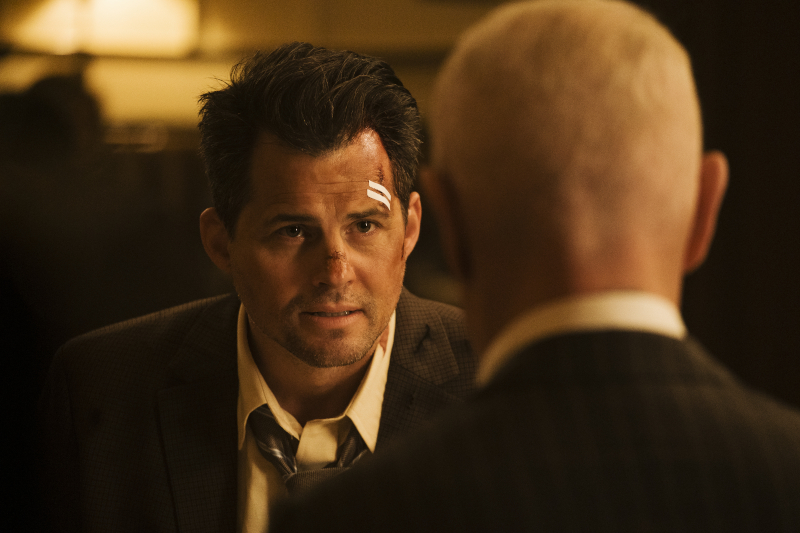
When he comes to, he has a cut on his head and is being looked after by the self-styled Benefactor (executive producer Neal McDonough from Captain America: The First Avenger, Joe Johnston, 2011; Flags of Our Fathers, Clint Eastwood, 2006; Minority Report, Steven Spielberg, 2002, Ravenous, Antonia Bird, 1999) who explains that Kevin has been shifted to another universe. The Benefactor takes him for a meal, in the course of which he explains that he is looking to recruit people to shift others around the multiverse in the furtherance of chaos and generally making people’s lives more miserable.
At Kevin’s suggestion as to how to convince him of all this, the Benefactor shifts their cowering waitress Tina (Rose Reid) to another world, causing her to vanish. The horrified Kevin refuses the Benefactor’s offer, and angers him by immediately praying about the situation to God the Father in front of his host.
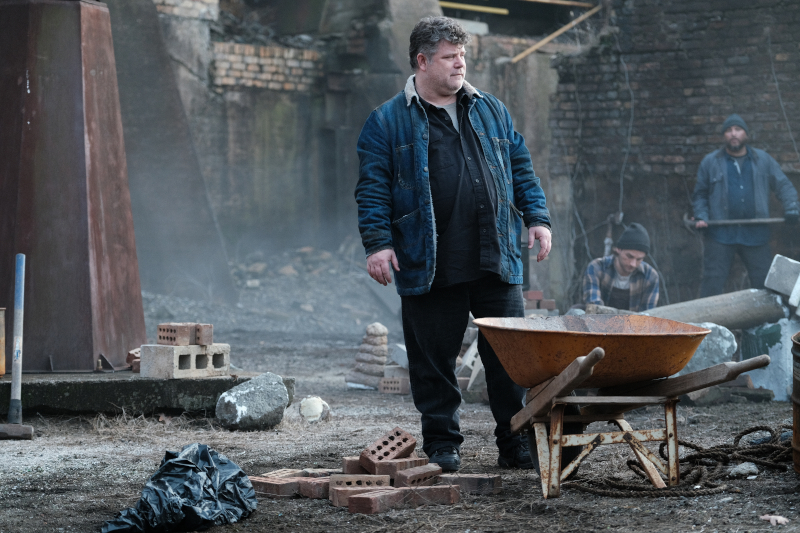
Five years later, missing his wife and branded “the Kevin who refused”, he lives a nondescript life writing down on paper half-remembered Bible passages to give to fellow worker and best mate Gabriel (Sean Astin from Stranger Things TV series, 2017-19; The Lord of the Rings trilogy, Peter Jackson, 2001-3; The Goonies, Richard Donner, 1985), apparently to pass on to others. Gabriel tells him of members of the Benefactor’s elite force who wear wristbands that allow them to shift people, making Kevin want to get his hands on one of the wristbands.
In the meantime, however, all Kevin can do is keep out of the way of the riot police and visit an illegal picture palace run by Russo (John Billingsley from Star Trek: Enterprise TV series, 2001-5) where subjects trigger the images from other worlds in the multiverse on the screen; in Kevin’s case, it triggers images of the wife from whom he is separated. Russo, meanwhile, is looking for his cat, which disappeared a long time ago.
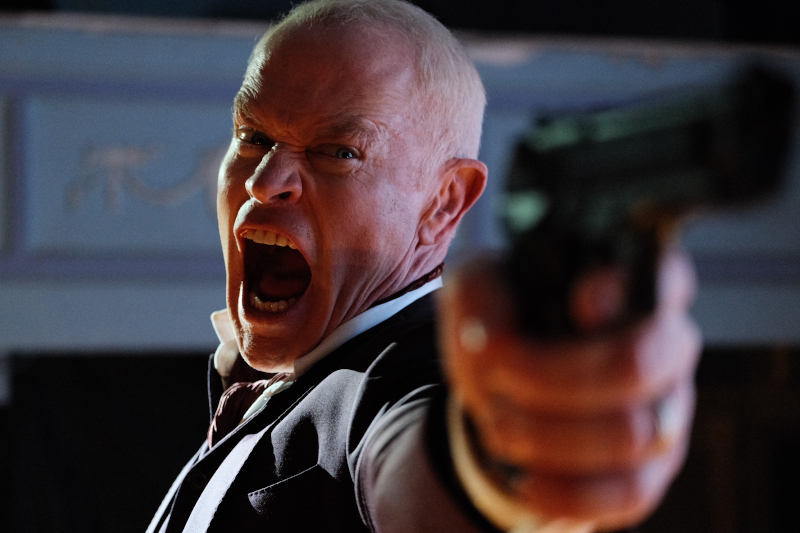
Leaning from the TV news that the Benefactor is about to return to recruit another Kevin in a staged restaurant event like his own, featuring press-ganged citizens playing the people involved, Kevin gets a gun from Gabriel with intent to confront and possibly kill the Benefactor, not to mention grabbing a wristband. However, things don’t go according to plan as Kevin shifts around the multiverse trying to find the version of Molly he married and runs into the banished, institutionalised Tina…
Pitched as science fiction, exploring parallel worlds – a subject tackled far more effectively in films as diverse as Back to the Future Part 2 (Robert Zemeckis, 1989) and Everything Everywhere All At Once (Daniels, 2022) – this is a drama aimed squarely at conservative American Christians, pushing pro-marriage and family values, devoid of sex apart from kissing or sitting on the bed briefly touching a partner’s thigh, yet in places perfectly happy to use a handgun to resolve a difficult situation.
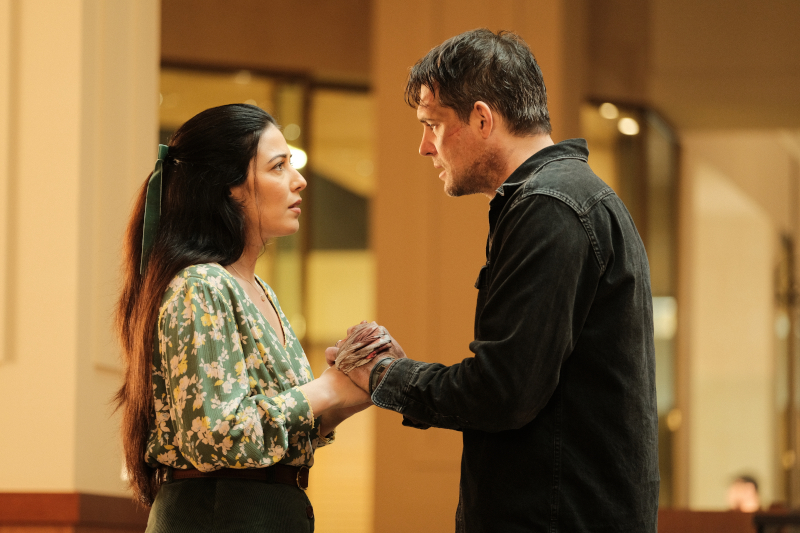
More worryingly, perhaps, in line with the Benefactor’s claim that different people see different events rather than the same event from different perspectives, there’s a hint that we’re in post-truth territory here, a prospect the narrative places before us but then steadfastly refuses to explore in any meaningful way.
At around the 70-minute mark, Kevin gets hold of a wristband and for about ten minutes shifts rapidly between worlds before the narrative settles back down to its plodding humdrum. Despite the straight-jacketing of the director-written script, Sean Astin turns in a reasonably rounded performance as the best friend, and at one point plays his role alongside several other versions of himself. The rest of the cast are solid if unremarkable.
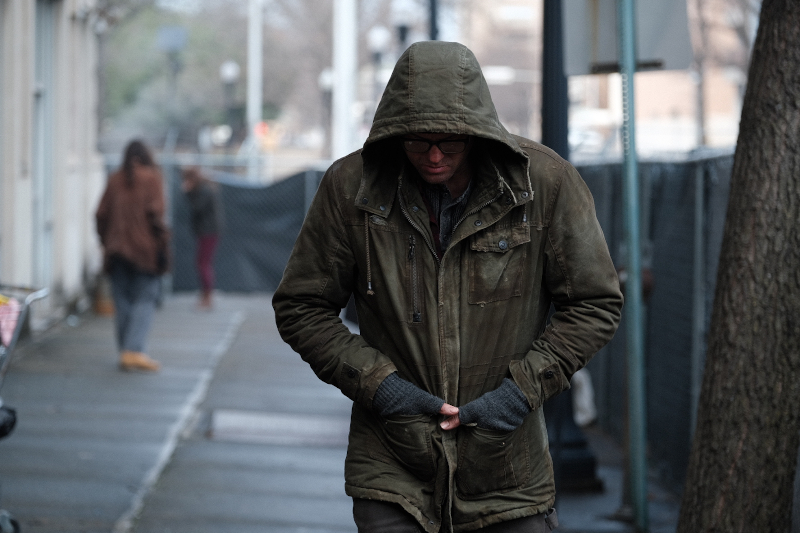
Russo’s cinema emporium is also worthy of note, a single viewer, big screen riff on the Cathode Ray Mission of Videodrome (David Cronenberg, 1983), from which film it also lifts the image of a male face literally pushing itself into or onto a screen showing a moving image of a desired female. The lightbulbs on the floor around the sole viewer’s cinema seat also recall similar light bulbs in the stage entertainment within Eraserhead (David Lynch, 1979). For the record, both those two films are, in this writer’s opinion, masterpieces, something The Shift most definitely is not.
This first feature to be produced in-house by US indie, Christian streaming service turned production house Angel Studios was crowdfunded on the back of the original, 22-minute short, five minutes at the end of which are an appeal for funds for this feature version, which makes it jarringly clear that this is intended as a “Christian” or “faith-based” film. It also owes a great deal to the Book of Job in the Bible, which I’m all for, at least in theory; it certainly didn’t do Martin Scorsese any harm when he remade Cape Fear (1991).
However, on the evidence presented here, Heasley is no Scorsese. His film is less an attempt to explore difficult spiritual truths than to put safe material on the screen for Angel’s conservative Christian constituency, whose reductionist, Biblical world view The Shift is specifically designed to bolster.
The Shift is out on digital from Monday, March 25th and Blu-ray / DVD from Monday, April 1st following its release in cinemas in the UK on Friday, December 15th.
Trailer:
